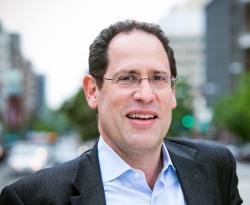Chapter 11
“Embrace a federal metropolitan agenda that promotes balanced growth, stimulates investment in cities and older suburbs and connects low-income families to employment and educational opportunities.”
The 2004 presidential election will take place during a period of profound change in the United States, comparable in scale and complexity to the latter part of the 19th century. Broad demographic forces—population growth, immigration, domestic migration, aging—are sweeping the nation and affecting settlement patterns, lifestyle choices and consumption trends. Substantial economic forces—globalization, deindustrialization, technological innovation—are restructuring our economy, altering what Americans do and where they do it.
Together, these complex and inter-related forces are reshaping the metropolitan communities that drive and dominate the national and even global economy. Cities—while still the disproportionate home to poor, struggling families—are re-emerging as key engines of regional growth, fueled by the presence of educational and health care institutions, vibrant downtowns, and distinctive neighborhoods. Suburbs, meanwhile, are growing more diverse in terms of demographic composition, economic function and fiscal vitality. In many respects, the differences between cities and suburbs are becoming less important than their similarities and their interdependence.
The nation’s grab bag of “urban” policies—subsidized housing, community reinvestment, community development, empowerment zones—does not address or even recognize the challenges emerging from this new metropolitan reality. The almost exclusive focus of these policies on central cities ignores the fact that an entire generation of suburbs now faces city-like challenges and limits the potential political coalition for change. Renewing city neighborhoods in isolation disregards the metropolitan nature of employment and educational opportunities and inhibits the access of low-income families to good schools and quality jobs. Furthermore, principally focusing on the “deficits” of communities fails to recognize that cities and older places have assets and amenities (e.g., entrepreneurs, educational institutions, density, waterfronts, historic districts) that are highly valued by our changing economy. In general, national “urban” policies largely ignore the broader market forces and other federal policies that grow economies, shape communities and influence peoples’ lives.
In shaping solutions by 2010, this chapter will contend that federal policies need to grow up and reflect the Metropolitan America that is rather than the urban America that was. It will argue that, after better than a half century of sprawl, that “urban” means “metropolitan”—central cities, their surrounding older suburbs, and the larger economic regions described by their effective labor market. Finally, it will put forward a progressive agenda to respond to the pressing economic, fiscal and social challenges faced by Metropolitan America.
Published by the Newmarket Press, What We Stand For gathers together 17 of the country’s best scholars, advocates and thinkers, outlining a “program for progressive patriotism” for the national conversation of 2004.
Bruce Katz is vice president of the Brookings Institution and founding director of its Center on Urban and Metropolitan Policy. From 1993 to 1996, Mr. Katz served as chief of staff to Henry G. Cisneros, the secretary of Housing and Urban Development. Previously, Mr. Katz served as senior counsel and then staff director of the United States Senate Subcommittee on Housing and Urban Affairs.
The Brookings Institution is committed to quality, independence, and impact.
We are supported by a diverse array of funders. In line with our values and policies, each Brookings publication represents the sole views of its author(s).



